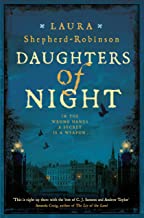Readers of my memoir, Please Miss We’re Boys, will know that I have history with Deptford. I taught in a boys’ school there in the late 1960s and early 1970s, just before the last of the old, arguably slummy, community housing was swept away to make room, eventually, for glittering blocks of yuppy flats with river views.
For all that, I did not know, until I read Laura Shepherd-Robinson’s enlightening, compelling novel (published in 2019), that after Liverpool and Bristol, Deptford was Britain’s busiest slave trade port. I suppose it isn’t something that Deptfordians want to shout about.
We start in 1781 where Shepherd Robinson’s characters lurk near, stride along, work and live in streets I knew and which are still there today such as Deptford Broadway (elegant and full of “little black pageboys and towering African footmen”) and of course Thomas Archer’s St Paul’s Church has already been up for 50 years. Deptford Reach, a mile from the tasteful Broadway is full of sails, ships, and slavers’ inns. The author is good at setting scenes and building atmosphere.
Captain Henry Corsham, a veteran from the wars in America, is summoned from his Mayfair home to Deptford which gives him, as narrator, a chance to describe it all. He is searching for his lawyer friend, Thaddeus Archer, who has disappeared. A body has been pulled out of the Creek and it’s been beaten, tortured and branded as if this (white) man were a slave. Corsham identifies it in horror. Archer was an anti-slavery campaigner and has paid a heavy price for opposing such a lucrative industry.
“Forgive my bluntness sir, but you’d need to work a spell upon the English people if you ever hoped to end slavery. They like cheap sugar in their tea and cheap tobacco in their pipes. No amount of handwringing will ever change that” Lucius Stokes, mayor of Depford, casually tells Corsham. One is reminded of present day debates about sweat shops or the environment – providing cheap goods at massive cost. Sugar was, in many ways, the 18th century equivalent of 21st century oil.
The novel turns into a complex “whodunnit” immaculately researched and very convincing. It is predicated on a slave ship called The Dark Angel which, appallingly, dumped its “cargo” in an insurance scam – a thinly disguised take on the real life, infamous Zong massacre in 1781 when 130 enslaved Africans were thrown overboard.
One of the most interesting characters is Cinnamon, a mixed race woman living with Stokes as a quasi-wife figure. She’s dressed like a Georgian lady, educated and sits in the parlour but, to Corsham’s horror, Stokes brutalises her. She was on board The Dark Angel and there’s much more to her than first appears. Scipio, Stokes’s black secretary becomes a key character too.
Blood and Sugar is a fine read even if it does make your own blood run cold at times. These stories need to be told and reworked so that people understand the almost unthinkable truth of what really happened. And given the current Black Lives Matter campaign it’s pretty timely.
The good news is that there’s a sequel, Daughters of the Night, publishing this month.

Next week on Susan’s Bookshelves: Black River by Will Dean